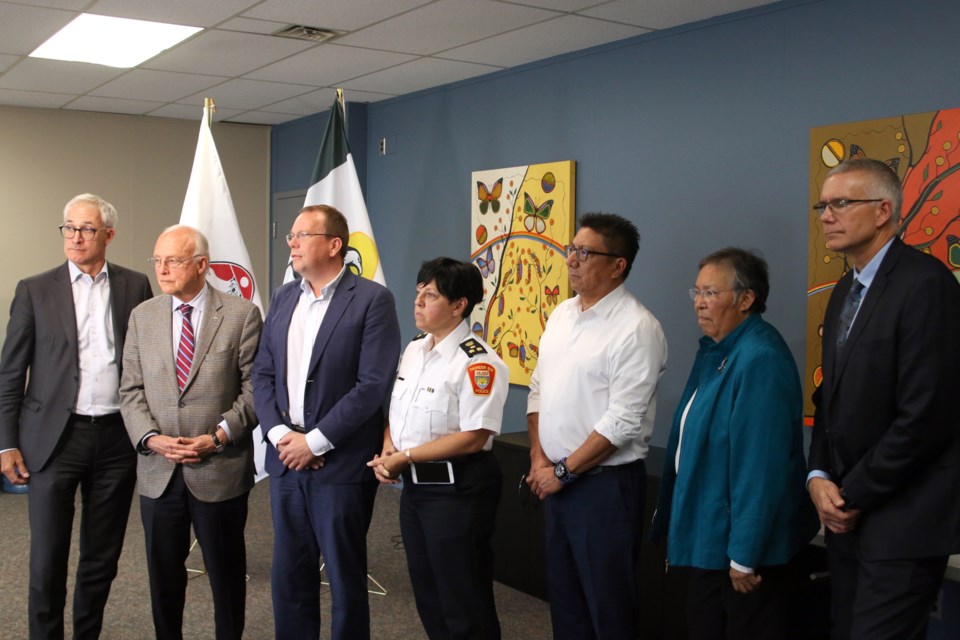THUNDER BAY - The team responsible for reinvestigating nine Indigenous sudden deaths say the primary focus will be helping the families of the victims find the answers they have been seeking for more than 20 years.
“We are here to serve the victim and the victim’s families with a full and complete investigation that is transparent,” said Ken Leppert, a retired detective superintendent with the Ontario Provincial Police. “There is never a guarantee we will find every piece of information available. We are going to do our best to find the truth and that will remain our one focus throughout.”
The executive governance committee, which is part of a three-tiered structure for the reinvestigation process, met on Wednesday to discuss the next steps in moving forward.
The Office of the Independent Police Review Director’s report released last year called for the nine cases to be reopened because the initial investigations lacked quality.
The nine cases that will be reinvestigated include Christine Gliddy, Shania Bob, Marie Spence, Aaron Loon, Sarah Moonias, as well as four cases involved in the Seven Youth Inquest – Jethro Anderson, Curran Strang, Kyle Morrisseau, and Jordan Wabasse.
According to Leppert, the blended investigative team, consisting of himself as well five detectives from the Thunder Bay Police Service and one from the Nishnawbe Aski Police Service, will review the cases by looking at the scenes and examining forensics and exhibits available to ensure they have a full understanding of the initial investigations.
“It’s very difficult to predict where it’s going to go,” he said. “Our focus at that point, which it is throughout, is finding the truth and in order to get there, it is critical we have the availability to follow the evidence.”
Leppert added that investigating historical cases, the oldest of which occurred 19 years ago, does present a whole host of challenges.
“One is the degradation of evidence and witnesses,” he said. “It’s to be expected that there won’t be the same availability of evidence as there would be in the first instance.”
But there are also advantages in the how investigations have evolved in the last 20 years.
“We have evolved forensically with DNA and other options, our technologies, our analytics, our software has evolved significantly,” Leppert said. “And our investigative practices used across Ontario have evolved significantly as well. Applying those modern approaches does give us advantages that did not exist during the time of the occurrences.”
Members of the committee admit that there is the possibility that the answers the family are seeking may not be found.
Nishnawbe Aski Nation Grand Chief, Alvin Fiddler, said they are doing what they can to support the families of the victims, but it is important to remain transparent and honest as well.
“I think all of us expect to some degree that even though there is a re-examination of all these cases, chances are the families who have been seeking answers for a long time now may not get the answers they have been looking for,” he said. That is something we need to be honest about with them.”
Whether concrete answers are found or not, others on the committee feel this is an important step in not only helping these nine families, but ensuring no one else in the province faces such uncertainty.
“Part of this is longer term, the importance we all feel of learning from this for the future,” said Justice Stephen Goudge. “We really hope out of this will come ways of investigation for the future for this kind of tragedy that will not have the reoccurrence of what occurred with these nine deaths.”
No firm details of cost were available but the committee said each group working on the reinvestigations will share in the cost.
Leppert said the cases are already being reviewed and he is hoping the actual reinvestigation on the first case will begin as soon as possible.
The reinvestigation is expected to be completed by next July, but Leppert said the team will take as much time as they need and not be influenced by outside sources.
“It’s really critical that the investigative team not concern themselves with outside influences, politics, whatever the case might be,” he said. “Whether it’s high profile or not high profile, you can’t prioritize between victims. The truth is what our focus has to be.”
